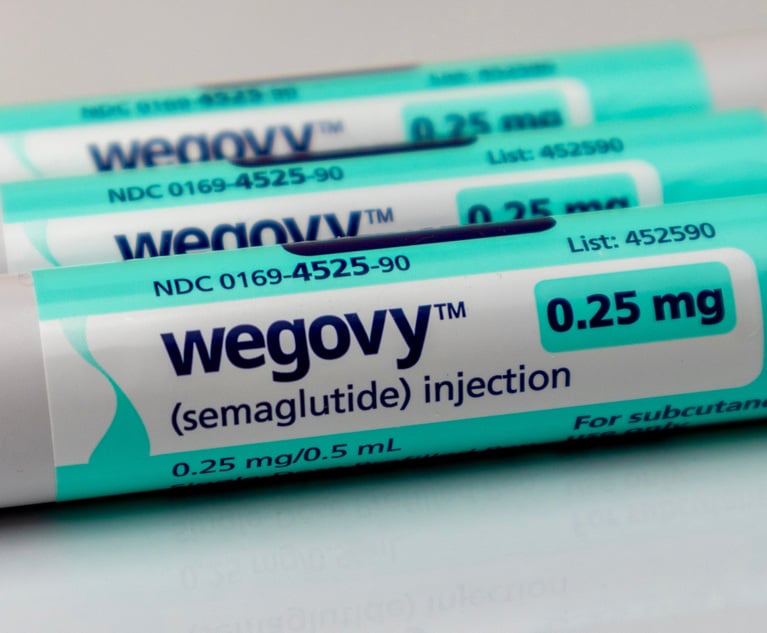 Edward Reines of Weil, Gotshal & Manges
Edward Reines of Weil, Gotshal & MangesDiagnostics Companies Battle in Delaware Court Over Game-Changing Transplant Tests
Fast-growing CareDx accuses Natera of infringing Stanford-developed patents that lets doctors use a blood test to determine if transplanted kidneys are being rejected.
March 26, 2019 at 03:22 PM
4 minute read
The original version of this story was published on The Recorder
CareDx Inc. has been on a big run. Over the last year, the molecular diagnostics company has seen its stock price quintuple, yielding a $1.5 billion market cap. The driver has been its patented method for assessing organ transplant rejections with a simple blood test.
Now other companies are moving into the market. Last month Natera Inc. announced a partnership with Thermo Fisher Scientific to market its own diagnostic test for kidney transplants.
That's got CareDx crying foul. The company sued for patent infringement Tuesday in Delaware federal court, asserting two patents developed in part by a famed Stanford University researcher.
“Years after Stanford researchers and CareDx put in the research and development work to invent this new method and bring it to the clinical setting, Natera uses CareDx's licensed technology without permission in violation of the patent laws,” Natera states in a complaint signed by Weil, Gotshal & Manges partner Edward Reines.
Natera said in statement that it does “not expect this suit to impact our commercialization plans or disrupt our operations in any way,” and that its technology is newer than that described in the CareDx patents.
Diagnostics is a tricky area of patent law. The U.S. Court of Appeals for the Federal Circuit reluctantly ruled in 2015 that a breakthrough discovery for using cell-free DNA in an expecting mother's blood to determine fetal abnormalities was directed to an unpatentable law of nature.
The court backed off that strict reading of Supreme Court case law somewhat last year in Vanda Pharmaceuticals v. West-Ward Pharmaceuticals. Earlier this month the Supreme Court asked the solicitor general's office for its views on Vanda, indicating the court's possible interest in the case.
Reines is litigating a different patent infringement case against Natera on behalf of Illumina involving a prenatal test. U.S. District Judge Susan Illston of San Francisco denied Natera's motion to dismiss the case last year, saying it was too soon for her to determine whether Illumina's method involves well-known, routine and conventional DNA amplification techniques.
Until recently, kidney tissue had to be biopsied to determine whether a body was rejecting the transplant. CareDx's AlloSure product uses advanced DNA sequencing to quantify donor-derived cell-free DNA, or ddcfDNA, from a blood draw. The amount of ddcfDNA indicates how well the recipient is accepting the transplanted organ, and helps nephrologists manage the use of immuno-suppressive therapy, which can have serious side effects.
Stanford obtained the patents at issue in Tuesday's suit in 2014 and 2017. The named inventors are Stephen Quake, Thomas Snyder and Hannah Valentine. Quake is co-president of CZ Biohub, a $600 million research center funded by Chan Zuckerberg that draws on Stanford, UC-Berkeley and UC-San Francisco expertise. Snyder is now the head of computational biology at Verily Life Sciences. Valentine is a senior investigator at the National Institute of Health's National Heart, Lung and Blood Institute.
Stanford licensed the patents to CareDx, a Brisbane company that has been in the diagnostics business since 1998 and went public in 2014.
“CareDx then brought this invention out of the lab and into the clinical setting,” Reines wrote in his complaint. “It's a game changer for transplant recipients,” he said in an interview.
CareDx's products cover kidney and heart transplants. The company is developing similar products for lung, liver and bone marrow transplantation.
In January, San Carlos-based Natera announced results from a study of its own donor-derived cell-free DNA test. That was followed shortly by the announcement of its partnership under Thermo Fisher's One Lambda brand. “We look forward to offering our customers a test that improves upon currently available options,” Thermo Fisher's president of transplant diagnostics, Parisa Khosropour, said in a written statement.
CareDx says it's clear from the clinical studies that Natera's method infringes its patents. CareDx is seeking both damages and an injunction to block Natera from selling its competing product.
Natera disagreed in its written statement. “We are not surprised that CareDx would attempt to disrupt the imminent commercialization of Natera's innovative organ transplant rejection test, which does not require donor genotyping, and will compete with CareDx's older test,” it said. “In recently published analytical and clinical validation studies, Natera's test demonstrated industry-leading performance.”
This content has been archived. It is available through our partners, LexisNexis® and Bloomberg Law.
To view this content, please continue to their sites.
Not a Lexis Subscriber?
Subscribe Now
Not a Bloomberg Law Subscriber?
Subscribe Now
NOT FOR REPRINT
© 2024 ALM Global, LLC, All Rights Reserved. Request academic re-use from www.copyright.com. All other uses, submit a request to [email protected]. For more information visit Asset & Logo Licensing.
You Might Like
View All
Wilson Sonsini Knocks Out Claims Against Inhibrx Biosciences in Trade Secrets Verdict

'I Don't Want to Die Fearfully': Outsiders Can't Get Help to Die in NJ
4 minute read
Novo Nordisk Files Patent Claims to Fend off Generic Rivals of Wegovy
3 minute read
Trending Stories
- 1Kirkland's Daniel Lavon-Krein: Staying Ahead of Private Equity Consolidation
- 2Many Southeast Law Firms Planned New, Smaller Offices in 2024
- 3On the Move and After Hours: Goldberg Segalla, Faegre Drinker, Pashman Stein
- 4Recent FTC Cases Against Auto Dealers Suggest Regulators Are Keeping Foot on Accelerator
- 5‘Not A Kindergarten Teacher’: Judge Blasts Keller Postman, Jenner & Block, in Mass Arb Dispute
Who Got The Work
Michael G. Bongiorno, Andrew Scott Dulberg and Elizabeth E. Driscoll from Wilmer Cutler Pickering Hale and Dorr have stepped in to represent Symbotic Inc., an A.I.-enabled technology platform that focuses on increasing supply chain efficiency, and other defendants in a pending shareholder derivative lawsuit. The case, filed Oct. 2 in Massachusetts District Court by the Brown Law Firm on behalf of Stephen Austen, accuses certain officers and directors of misleading investors in regard to Symbotic's potential for margin growth by failing to disclose that the company was not equipped to timely deploy its systems or manage expenses through project delays. The case, assigned to U.S. District Judge Nathaniel M. Gorton, is 1:24-cv-12522, Austen v. Cohen et al.
Who Got The Work
Edmund Polubinski and Marie Killmond of Davis Polk & Wardwell have entered appearances for data platform software development company MongoDB and other defendants in a pending shareholder derivative lawsuit. The action, filed Oct. 7 in New York Southern District Court by the Brown Law Firm, accuses the company's directors and/or officers of falsely expressing confidence in the company’s restructuring of its sales incentive plan and downplaying the severity of decreases in its upfront commitments. The case is 1:24-cv-07594, Roy v. Ittycheria et al.
Who Got The Work
Amy O. Bruchs and Kurt F. Ellison of Michael Best & Friedrich have entered appearances for Epic Systems Corp. in a pending employment discrimination lawsuit. The suit was filed Sept. 7 in Wisconsin Western District Court by Levine Eisberner LLC and Siri & Glimstad on behalf of a project manager who claims that he was wrongfully terminated after applying for a religious exemption to the defendant's COVID-19 vaccine mandate. The case, assigned to U.S. Magistrate Judge Anita Marie Boor, is 3:24-cv-00630, Secker, Nathan v. Epic Systems Corporation.
Who Got The Work
David X. Sullivan, Thomas J. Finn and Gregory A. Hall from McCarter & English have entered appearances for Sunrun Installation Services in a pending civil rights lawsuit. The complaint was filed Sept. 4 in Connecticut District Court by attorney Robert M. Berke on behalf of former employee George Edward Steins, who was arrested and charged with employing an unregistered home improvement salesperson. The complaint alleges that had Sunrun informed the Connecticut Department of Consumer Protection that the plaintiff's employment had ended in 2017 and that he no longer held Sunrun's home improvement contractor license, he would not have been hit with charges, which were dismissed in May 2024. The case, assigned to U.S. District Judge Jeffrey A. Meyer, is 3:24-cv-01423, Steins v. Sunrun, Inc. et al.
Who Got The Work
Greenberg Traurig shareholder Joshua L. Raskin has entered an appearance for boohoo.com UK Ltd. in a pending patent infringement lawsuit. The suit, filed Sept. 3 in Texas Eastern District Court by Rozier Hardt McDonough on behalf of Alto Dynamics, asserts five patents related to an online shopping platform. The case, assigned to U.S. District Judge Rodney Gilstrap, is 2:24-cv-00719, Alto Dynamics, LLC v. boohoo.com UK Limited.
Featured Firms
Law Offices of Gary Martin Hays & Associates, P.C.
(470) 294-1674
Law Offices of Mark E. Salomone
(857) 444-6468
Smith & Hassler
(713) 739-1250






